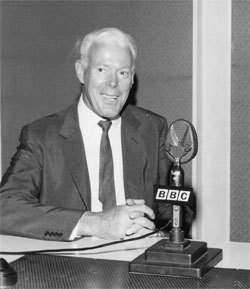Crossing against the Red
Trevor Leggett was head of the Japanese Department of the BBC.

This is one of his broadcasts to Japan
Zubari (undated)
Hello listeners!
If you were at a lonely country crossing, with traffic lights but no traffic coming at all, would you wait for the Green Light before crossing the road?
Many British people would cross against the Red. There is no reason for waiting. I have seen some Japanese people waiting for the Green light before crossing, even when there was no traffic at all. Some newspaper correspondents have seen this too. Some of them say it is an example of unthinking, mechanical, obedience to a rule, even when the rule is obviously meaningless on this occasion. They regard this as a weakness in intelligence; the Japanese are not using their mind.
I have sometimes been asked about this point, and perhaps some of you listeners will one day be asked about it. I will tell you what I reply to these critics of the Japanese attitude:
You are wrong to think that Japanese people do not use their mind. Your view of the situation is too narrow. Japanese viewpoint is much wider: it includes all the situations where one wishes to cross at traffic lights. Normally, it is safe to cross when there is a Green light, and dangerous to cross when the light is Red.
It is quite true that one can look at the road, and use one’s intelligence to judge whether it is necessary to wait for the Green light, or not. But the point is, that it is much better to lay down a conditioned reflex, as it is called. Then one will do the right, whether one is thinking or not. Suppose one has had a bad shock, or there is a tremendous business crisis and one is thinking about that, or even suppose that one is drunk. Then one has no mind to spare for thinking about traffic lights.
If there is a conditioned reflex, the body will wait for the Green light, without thinking at all.
But if sometimes one has crossed against the Red light, then there is no conditioned reflex. Then at times when the mind is distracted, one may absent-mindedly step out against the Red. And there may be an accident.
So, the Japanese idea is: always do the correct thing, even if it not necessary this time. Then one is laying down a good habit for the future.” That is what I say to the critics of Japanese “mechanical behaviour”.
I learnt this myself in Japan in connection with Judo. Like most ambitious young Fourth Dan grades, I did not like to practise with weak Judo players. But in those days at the Kodokan, there were very few Japanese teachers who knew English.
So, I was sometimes asked to give lessons to Americans and other foreigners who had come to the Kodokan, but were only about Shodan grade. I could throw them very easily, even with one hand. I used to give them their lesson, and then practise Randori with them briefly. I never took any trouble to use much skill: Some of them I could just push, and they would fall over.
One day a very senior teacher, Nagaoka 10th Dan reprimanded me. He said: “You do not like practising with these weak players. But it is your duty to do so. So, you must do it. But be careful that you do not spoil your own Judo while practising with them. You can throw them very easily, without using a proper Nage-waza. I have been watching you do that. But you are setting up careless habits in yourself. You could not throw another Fourth Dan by those methods which you are using. Now remember: when you practise with a beginner, always use a correct technique, as if he were a very strong Judoka. When I practise with smaller children, I always use correct technique.
Next day, there was a big children’s class at the Kodokan. Some of them were only about six years old. Nagaoka 10th Dan practised with some of them. I watched carefully. Though he could have picked up his little opponent with one hand and simply dropped him on the floor, he never in fact used his superiority in strength. He used classical techniques, very gently but very perfectly.
This was a good lesson for me I realized that those small children were seeing, and experiencing, perfect Judo techniques. Unconsciously, they were learning good style.. He gave little direct instruction to them, but they learnt it by unconscious limitation.
So, I learnt in the Japanese Judo dojo the important principle of laying down good habits. “Always do the right thing, even if it is not necessary at this particular time.” Applied to broadcasting, it is: “Smile at the microphone and treat it as a human being, even though it is not. Then your talk will be lively.” I hope I have followed this principle in this broadcast!
© Trevor Leggett